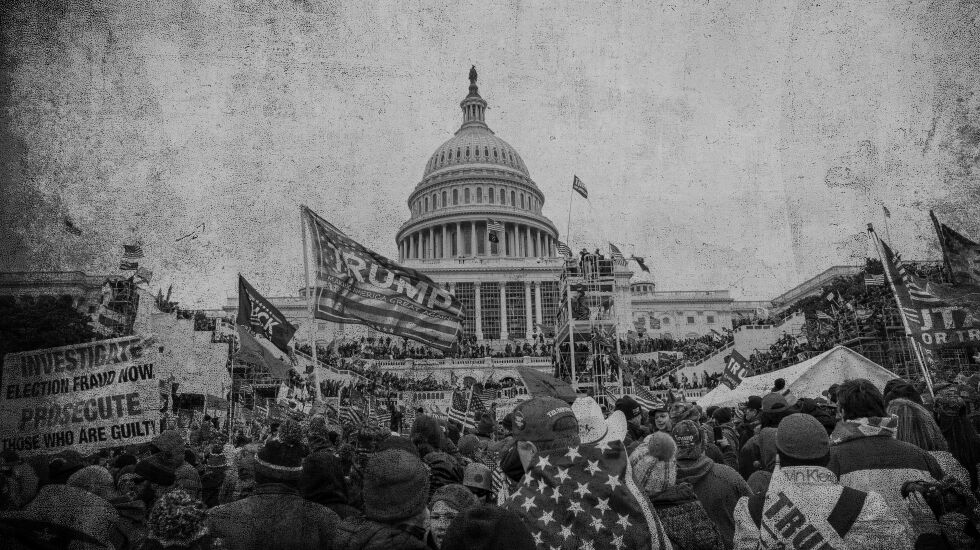
Chicago’s new police superintendent on Tuesday vowed “thorough investigations” after WBEZ and the Sun-Times revealed misconduct records of cops tied to the extremist Oath Keepers.
But neither he nor other police brass explained the department’s lack of action since a membership list was leaked two years ago.
Supt. Larry Snelling told a City Council hearing there would be “stringent” efforts to root out extremists and “remove those members from our ranks.”
“It serves the Chicago Police Department in no way, in no way good, to have members amongst our department who are filled with bias or members of hate groups,” Snelling said. “And we will not tolerate it.”
His comments came days after WBEZ, the Sun-Times and the Organized Crime and Corruption Project began publishing a joint investigation, “Extremism in the Ranks,” which found 27 current and former Chicago police officers whose names appeared in leaked membership records for the Oath Keepers.
Nine remain on active duty, some with troubling disciplinary records.
Yolanda Talley, chief of the Bureau of Internal Affairs, signaled those nine officers are being targeted and promised to close the investigation “in less than six months.”
This isn’t the first time police officials have used tough talk to open an investigation into officers linked to the Oath Keepers, a far-right group that was at the center of the insurrection at the U.S. Capitol.
When National Public Radio reported in November 2021 that a group of Chicago cops was found on the leaked membership roster for the group, the department opened a probe and insisted there was “zero tolerance for hate or extremism within CPD.”
That investigation, involving just three officers, was closed after the department determined that joining the group didn’t warrant a rule violation.
Talley claimed that probe was hampered because investigators “did not have the names of the officers.”
But the department apparently overlooked a letter from the Anti-Defamation League, which provided the names of eight Chicago police officers on the leaked rolls.
“It is important to note that inclusion on this list means that at some point they signed up for membership,” the ADL wrote to then-First Deputy Supt. Eric Carter back in August 2022. “The fact that a member of law enforcement joined the Oath Keepers is extremely concerning and warrants investigation.”
Pressed about the letter last week, a department spokesperson said a new investigation had been opened into its allegations. It was unclear how that overlaps with the investigation announced by Snelling and Talley.
Talley said looking into officers’ backgrounds and how they’ve performed on the job will “be part of the investigation” that has been recently opened.
Personnel records show many of the Chicago cops who signed up for the Oath Keepers faced accusations of serious misconduct, including racist comments.
Some of the Chicago cops disclosed their ties to the department and promised to recruit fellow officers for the Oath Keepers, according to the leaked membership records obtained by the OCCRP.
The “Extremism in the Ranks” investigation also found other law enforcement agencies in Illinois shied away from disciplining officers whose names appeared on the Oath Keepers list, including the Illinois State Police and the University of Illinois-Chicago campus force.
Ald. Pat Dowell, 3rd, urged a quick response from the Chicago Police Department.
“Given the fact that we really want to focus on changing the whole culture in the police department, this to me is like low-hanging fruit,” Dowell said. “Let’s get them and get them out.”
Ald. Matt O’Shea, whose 19th Ward is home to many officers, also called for a thorough probe into cops with connections to the Oath Keepers.
“There’s no place for that,” he told Talley. “I appreciate your strong position on that, getting to the bottom of it. We need to rebuild trust in communities all across our city. We need to partner with the police.”
Some Black Chicagoans told WBEZ and the Sun-Times they were subjected to racial slurs from officers whose names appeared on the Oath Keepers list. But the officers often avoided any disciplinary action.
One sergeant wrote to a Black community activist in the Englewood area, telling her on official city email that he had no concern for poor people in the inner city. That member of the force, Michael Nowacki, received just a three-day suspension.
A former cop who signed up for the Oath Keepers evaded any misconduct charges, although he faced multiple complaints of racial slurs and accusations that he made bigoted comments at a CPD training facility.
A Black veteran officer who served alongside that cop said the work environment at the gun range was like “a Ku Klux Klan rally.”
Ald. Rossana Rodriguez, 33rd, said “it’s heartbreaking to know that there are people in the force that belong to these organizations.”
“It’s scary, and we need to know that it’s not going to happen,” she said. “How are we prepared to prevent that from happening again? How are we prepared to intervene, to detect when there are officers that are engaging with these kinds of organizations?”
Talley pointed to a draft policy that would explicitly prohibit officers from joining hate and extremist groups.
“We’re looking at the best practices from other departments across the country that we can include in this policy to make sure we prevent and get ahead of any future incidents and allegations of white supremacist organizations in the Chicago Police Department,” Talley said.







